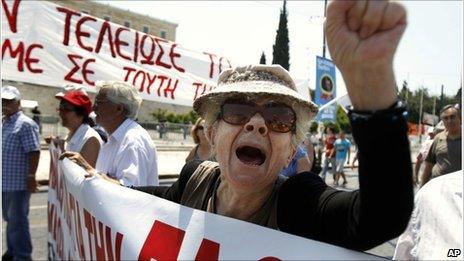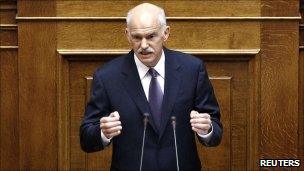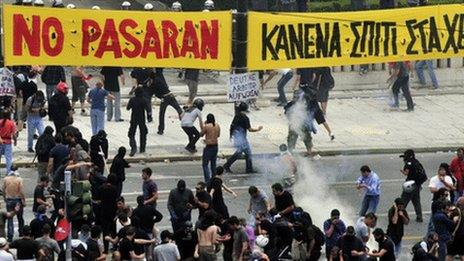Greece crisis: Revolution in the offing?
- Published
- comments

For more than three weeks protesters have occupied the square opposite the Greek parliament. They have pitched their blue and grey tents and hung their slogans from the orange trees.
"We got the solution. Revolution," declares one poster. "Rise up people of the world," urges another.
Inspired by the Arab uprisings, they have dug in to oppose further spending cuts in exchange for a second bail-out by the EU and IMF.
The encampment, however, hardly crackles with revolutionary fervour. It has the feel of an anti-globalisation village, nestled in amongst Africans selling handbag copies and bright-rimmed sunglasses.
The Greek Prime Minister George Papandreou is depicted as riding the CIA/IMF plane. He is portrayed as a capitalist stooge.
The activists bicker amongst themselves about real democracy.
"We have no leaders here," said one proudly. They go into contortions about interviews in case by speaking out it is judged as assuming a leadership role.
No zeal
There are references to the revolutions of 1789 and 1848 and La Commune. But amongst the hammocks and tables there is no agreed agenda. If there is a unifying theme, it is hatred of the bankers and international capitalism.
They are indignant but they lack the will, the determination, the message, the zeal to shake Athens.
What they do do is to serve as a rallying point. In the cool of the evenings families bring their children here. They are a magnet for those who feel bitter and let down.
The latest poll suggests that 47% of Greeks oppose the latest package cuts as demanded by European paymasters and the IMF.
But more dangerous than the activists is the mood of ordinary people. They are despondent. As academic Yannis Varoufakis told me "above all they resent the loss of dignity".
They dislike the bail-outs. It eats away at their pride.

Papandreou may win his confidence vote, but has a divided country to run
They no longer know who to believe. They were told last year that short-term pain would deliver results. It hasn't. The German Chancellor Angela Merkel says Greece has "cut new borrowing by 5%. Remarkable savings but not enough".
All many Greeks see is rising national debt and unemployment.
The mood is tinder dry. A city at a tipping point. Power workers are about to go on strike threatening power cuts amidst the stifling heat of summer.
Despondent
I went to Piraeus to visit a family. Roula, the mother, is threatened with losing her job. She says finding another, at her age, is all but impossible. The young are leaving. "This will be a country of old people," she says.
Her daughter Barbara, 23, is thinking of emigrating much as young people are in Ireland and Spain.
This is the real crisis in the eurozone. A young generation lost, without work. The figures are staggering.
In Spain unemployment for 16 to 24 year olds is running at 43%. In Italy it is more than 25%. In Europe millions of highly educated young people are being denied the opportunity of working.

Unemployment is the real threat to the eurozone
The eurozone has proved a terrible trap for so many countries. The low interest rates, the easy money led to property booms, speculation, and piles of debt. Reducing the debt is now exacting a terrible toll on a generation.
In Spain they called themselves the "indignants" but no-one knows what this generation will do with their anger.
George Papandreou, opening a debate on a vote of confidence, has called for "national accord". He said cash reserves would soon be exhausted. The image of national division was not helping the country survive. He offered a referendum in September on a new constitution that would make it easier to pursue corrupt officials.
He will probably win the vote of confidence on Tuesday. The week after, parliament will vote on the austerity package.
That will be a tense moment, with the risk of further violence. Even if there is another bail-out of around 110bn euros, Greeks have lost faith in the plan. All they see is debt piling on debt.
This is where the danger lies. A creeping despair. Injured national pride. Ten years of austerity.
Even so the bet must be that the Greeks reluctantly, sullenly, will go along with new austerity but I have sensed a despair that last year just wasn't there and no-one knows where that will lead.
- Published15 June 2011

- Published21 May 2011
